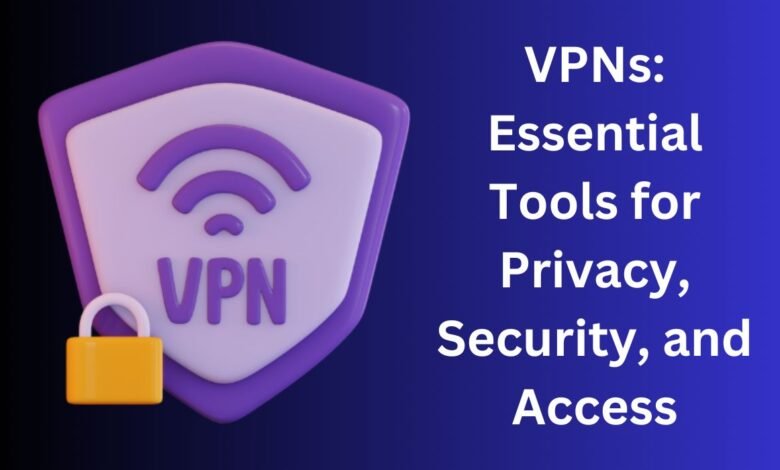VPNs: Essential Tools for Privacy, Security, and Access
Discover how VPNs safeguard privacy, enhance security, and unlock access to restricted content. Essential tools for the digital age.

Virtual Private Networks, commonly known as VPNs, serve as a crucial tool in the modern digital landscape. At their core, VPNs create a secure, encrypted connection between your device and the internet, acting as a private tunnel through which your data travels. This encryption ensures that your online activities remain confidential and protected from prying eyes, a significant advantage in an age where data breaches and cyber-attacks are increasingly common.
One of the primary functions of a VPN is to safeguard user privacy. When connected to a VPN, your real IP address is masked and replaced with one from the VPN provider’s server. This makes it significantly harder for third parties, including hackers and even your Internet Service Provider (ISP), to track your online activities or pinpoint your physical location.
VPNs also play a pivotal role in allowing users to access restricted content. By connecting to a server in a different geographic location, users can bypass regional restrictions and censorship, gaining access to websites, streaming services, and other online resources that might otherwise be unavailable in their country. This capability is particularly beneficial for individuals living in regions with stringent internet censorship or for those traveling abroad who wish to access content from their home country.
Another common use of VPNs is to protect data when connected to public Wi-Fi networks. Public hotspots, such as those found in cafes, airports, and hotels, are notoriously insecure and can be a hotbed for cybercriminal activity. VPNs provide an additional layer of security by encrypting your internet connection, thus safeguarding sensitive information such as login credentials, financial details, and personal communications from potential eavesdroppers.
Moreover, VPNs offer a means of maintaining anonymity online. By concealing your real IP address and encrypting your internet traffic, a VPN can help prevent websites, advertisers, and other entities from building a detailed profile of your browsing habits. This level of anonymity is invaluable for individuals who prioritize their privacy or who engage in activities that require discretion, such as whistleblowing or investigative journalism.
The Appeal of Free VPNs
Free Virtual Private Networks (VPNs) have gained significant popularity in recent times, thanks to their cost-saving allure. For many users, the idea of safeguarding their online privacy without incurring any financial burden is incredibly appealing. The notion of accessing restricted content, browsing anonymously, and securing public Wi-Fi connections without spending a dime taps directly into the consumer’s desire for value and convenience.
One of the primary attractions of free VPNs is their ease of access. With a few clicks, users can download and install these services on their devices, often without the need to provide extensive personal information. This simplicity and convenience are pivotal in driving users towards free options, especially those who are not tech-savvy or who are looking for a quick solution to their privacy concerns.
The promise of privacy and security is another significant factor that draws users to free VPNs. Many people are becoming increasingly aware of the risks associated with online activities, such as data breaches, hacking, and surveillance. Free VPN providers capitalize on these concerns by marketing their services as a means to protect users’ privacy and secure their data. The idea of achieving this level of security without any financial commitment is naturally appealing.
The widespread availability and aggressive marketing tactics employed by free VPN providers further contribute to their appeal. These services are often heavily advertised on social media platforms, search engines, and app stores, making them highly visible to potential users. In addition, many free VPNs offer enticing features such as unlimited bandwidth or access to servers in multiple countries, which can be particularly attractive to those looking to bypass geo-restrictions and access content from different regions.
In summary, the allure of free VPNs lies in their cost-saving benefits, ease of access, and the promise of privacy without financial commitment. Coupled with widespread availability and strategic marketing, these factors make free VPNs an enticing option for users seeking to protect their online privacy. However, it is crucial to delve deeper into the implications of using free VPNs to fully understand the potential risks involved.
How Free VPNs Operate
Free Virtual Private Networks (VPNs) often attract users with the promise of no-cost privacy and security. However, understanding the operational model behind these services is crucial for making informed decisions. Free VPNs must cover their operational costs in some manner, which typically involves monetizing user data, displaying advertisements, or offering limited functionality to entice users into purchasing premium versions.
One of the primary ways free VPNs generate revenue is through the sale of user data. Unlike paid VPN services, which generally prioritize user privacy, free VPNs may collect and sell browsing history, connection logs, and personal information to third-party advertisers and data brokers. This practice directly contradicts the privacy assurances that users seek when using a VPN.
Another common method is through advertisements. Free VPN services often display ads within their applications or redirect users to sponsored websites. This advertising revenue helps offset operational costs but can significantly detract from the user experience. Moreover, these advertisements can sometimes harbor malware, further jeopardizing user security.
Additionally, many free VPNs offer limited functionality to encourage users to upgrade to their premium versions. This strategy involves restricting data usage, limiting server locations, or throttling connection speeds for free users. While this approach is less invasive than data selling or ad placements, it still compromises the overall effectiveness of the VPN service.
The following table outlines some common free VPNs and their associated practices:
| Free VPN | Monetization Method | Limitations |
|---|---|---|
| Hotspot Shield | Advertisements, Data Selling | Limited Bandwidth, Few Server Locations |
| Hola VPN | Data Selling, Peer-to-Peer Network | Security Risks, Limited Privacy |
| Betternet | Advertisements | Slow Speeds, Limited Data Usage |
| ProtonVPN Free | Freemium Model | Limited Servers, Reduced Speed |
| Windscribe Free | Freemium Model, Advertisements | 10GB Data Cap, Limited Servers |
By understanding these practices, users can better evaluate whether the trade-offs of using a free VPN align with their privacy and security needs.
Privacy Risks Associated with Free VPNs
Free VPNs often promise anonymity and security without any cost, but the reality is far more complex and concerning. One of the primary privacy risks associated with free VPNs is data logging. Unlike reputable paid VPN services that maintain strict no-logs policies, free VPN providers often log user data. This data can include your browsing history, IP address, and personal information, which can then be sold to third parties for profit.
Another significant risk is the selling of user data to third parties. Many free VPN providers generate revenue by monetizing user data. This practice not only undermines the fundamental purpose of using a VPN for privacy but also exposes users to targeted advertising and potential identity theft. The lack of transparency in how these free services handle and share data makes it difficult for users to trust them.
Weak encryption standards are another critical issue. While paid VPN services typically use robust encryption protocols to secure user data, free VPNs often employ outdated or weak encryption methods. This vulnerability makes it easier for cybercriminals to intercept and access your data, defeating the purpose of using a VPN in the first place. Moreover, weak encryption can expose users to man-in-the-middle attacks, where an attacker can intercept and alter communications between the user and the internet.
Additionally, free VPNs can expose users to malware. Some free VPN applications have been found to contain malicious code that can infect your device. For example, the popular free VPN Hola was discovered to be selling user bandwidth to create a botnet, which could be used for malicious activities without the user’s knowledge. This not only compromises user privacy but also puts their devices at risk.
Real-world examples highlight these dangers. In 2018, it was revealed that the free VPN service Onavo Protect, owned by Facebook, was collecting user data to analyze browsing habits, which was then used for market research. Similarly, the research conducted by the Commonwealth Scientific and Industrial Research Organisation (CSIRO) found that 75% of free VPNs contained tracking embedded in their software.
In summary, while the allure of free VPNs may be strong, the privacy risks they pose are substantial. Data logging, selling user data, weak encryption, and exposure to malware are significant concerns that can compromise user privacy and security. It is crucial to evaluate the true cost of “free” services and consider opting for reputable paid VPN providers that prioritize user privacy and security.
Security Concerns
Free VPN services, while enticing due to their cost-free nature, frequently fall short in providing robust security measures, often exposing users to significant risks. One of the primary concerns is the lack of advanced security protocols. Unlike paid VPNs, which typically employ cutting-edge encryption standards such as AES-256, free VPNs often rely on outdated or weaker encryption methods. This vulnerability leaves user data susceptible to interception and unauthorized access.
Another critical issue is the potential for VPN hijacking. With inadequate security infrastructure, free VPNs can be compromised by cybercriminals who hijack the VPN servers. This allows attackers to monitor and manipulate user data, effectively nullifying the privacy benefits that a VPN is supposed to provide. The absence of regular security updates and patches further exacerbates this risk, making free VPNs an attractive target for hackers.
Additionally, free VPNs are more prone to various forms of cyber-attacks, including malware and phishing attacks. Many free VPN providers lack the resources to implement comprehensive security measures, leaving users unprotected from malicious entities. In contrast, premium VPN services invest heavily in security, offering features such as malware scanning, ad blockers, and phishing protection to safeguard user data.
The following comparison table highlights the disparity in security features between free and paid VPN services:
| Security Feature | Free VPN | Paid VPN |
|---|---|---|
| Encryption Standard | Outdated/Weak | AES-256 |
| Server Security | Vulnerable to Hijacking | Regular Security Audits |
| Cyber-attack Protection | Limited | Comprehensive (Malware, Phishing) |
| Security Updates | Infrequent | Frequent |
In summary, while free VPNs may seem like a cost-effective solution for online privacy, the security risks they pose can far outweigh the benefits. Opting for a paid VPN service ensures robust security protocols, regular updates, and comprehensive protection against cyber threats, safeguarding your privacy effectively.
Impact on Internet Speed and Performance
Free VPNs are often seen as a convenient way to secure online activities without incurring additional costs. However, users frequently experience a significant impact on internet speed and overall performance when using these services. One of the primary reasons is bandwidth limitations. Free VPN providers typically offer limited bandwidth to conserve resources and manage a high number of users. This restriction can lead to slower internet speeds, particularly noticeable during activities that require substantial data, such as streaming video or downloading large files.
Another common issue is server congestion. Free VPN services generally operate with a limited number of servers that must accommodate a vast user base. During peak usage times, these servers can become overcrowded, resulting in reduced connectivity and slower speeds. Users might find that their internet connection is unstable, with frequent drops or lag, making it difficult to maintain a consistent online experience.
Throttling is yet another factor that can hamper the performance of free VPNs. Some providers intentionally slow down the connection speed to manage the load on their servers. This practice ensures that the service remains available to all users but significantly diminishes the quality of the connection. Users engaging in activities requiring high-speed internet, such as online gaming or video conferencing, will likely find this throttling particularly disruptive.
Typical performance drawbacks of free VPNs include:
- Bandwidth limitations: Restricts the amount of data that can be transferred, leading to slower speeds.
- Server congestion: Overcrowded servers result in unstable connections and reduced internet speed.
- Throttling: Intentional slowing down of the connection to manage server load, affecting high-speed internet activities.
Overall, while free VPNs may offer a semblance of security, the compromised internet speed and performance often outweigh the benefits, making them a less desirable option for users seeking efficient and reliable online privacy.
Identifying Trustworthy VPN Services
When seeking a reliable and secure VPN service, it is crucial to consider several key factors. A paramount feature to look for is a strict no-log policy. This ensures that the VPN provider does not store any information about your online activities, safeguarding your privacy. Strong encryption is another essential attribute, offering robust protection against potential eavesdroppers and hackers. Look for VPNs that employ at least AES-256 encryption, considered the gold standard in the industry.
Transparent business practices are also indicative of a trustworthy VPN service. Reputable providers often undergo independent security audits and publish their findings. This transparency not only builds trust but also demonstrates a commitment to maintaining high security standards. Additionally, consider the jurisdiction in which the VPN operates. Providers based in countries with stringent privacy laws are typically more reliable.
User reviews can provide valuable insights into the real-world performance and reliability of a VPN service. Positive reviews on various platforms signal a strong reputation and consistent user satisfaction. However, it is essential to discern genuine feedback from potentially biased or sponsored reviews.
To aid in your selection process, below is a comparison table showcasing the features of top-rated paid VPNs:
| VPN Service | No-Log Policy | Encryption | Independent Audits | User Reviews |
|---|---|---|---|---|
| ExpressVPN | Yes | AES-256 | Yes | 4.5/5 |
| NordVPN | Yes | AES-256 | Yes | 4.4/5 |
| CyberGhost | Yes | AES-256 | Yes | 4.3/5 |
| Surfshark | Yes | AES-256 | Yes | 4.2/5 |
Choosing a VPN service with these attributes will significantly enhance your online privacy and security, mitigating the risks associated with using free VPNs. By prioritizing no-log policies, strong encryption, transparent business practices, and positive user reviews, you can confidently select a trustworthy VPN provider that aligns with your privacy needs.
- Redmi 13 108MP Camera Paired with Fun Features to Unleash Your Creativity
- OnePlus 11R 5G vs Realme GT 6T: What Should You Pick?
VPN Essentials Pros and Cons
When choosing between free and paid VPNs, it’s crucial to weigh the pros and cons to make an informed decision. Below is a comprehensive comparison of the advantages and disadvantages of each type of VPN service.
Free VPNs
Pros:
1. Cost-Effective: Free VPNs are, as the name suggests, free of charge. This makes them an attractive option for those not wanting to spend money.
2. Accessibility: They are widely available and can be easily downloaded and installed without any financial commitment.
3. Basic Protection: Free VPNs offer fundamental privacy protection, which may suffice for light internet users.
Cons:
1. Limited Features: Free VPNs often come with restricted features, such as limited bandwidth, fewer server locations, and slower connection speeds.
2. Privacy Risks: Many free VPNs collect user data and sell it to third parties to cover costs, posing significant privacy risks.
3. Unreliable Performance: Free VPNs are notorious for inconsistent connectivity and frequent disconnections, which can be frustrating.
4. Ads and Malware: Free VPNs often display ads and, in some cases, may expose users to malware.
Paid VPNs
Pros:
1. Enhanced Privacy: Paid VPNs typically have strict no-log policies, ensuring that user data is not collected or sold.
2. Better Performance: They offer faster connection speeds, more server locations, and greater reliability.
3. Advanced Features: Paid VPNs come with additional features such as kill switches, split tunneling, and enhanced encryption.
4. Customer Support: Users have access to dedicated customer support for troubleshooting and assistance.
Cons:
1. Cost: The primary disadvantage is the subscription fee, which can be a deterrent for budget-conscious users.
2. Complexity: Advanced features may require a learning curve for those not tech-savvy.
By considering the above pros and cons, users can better understand the trade-offs involved in choosing between free and paid VPN services, helping them select the one that best meets their privacy and security needs.



